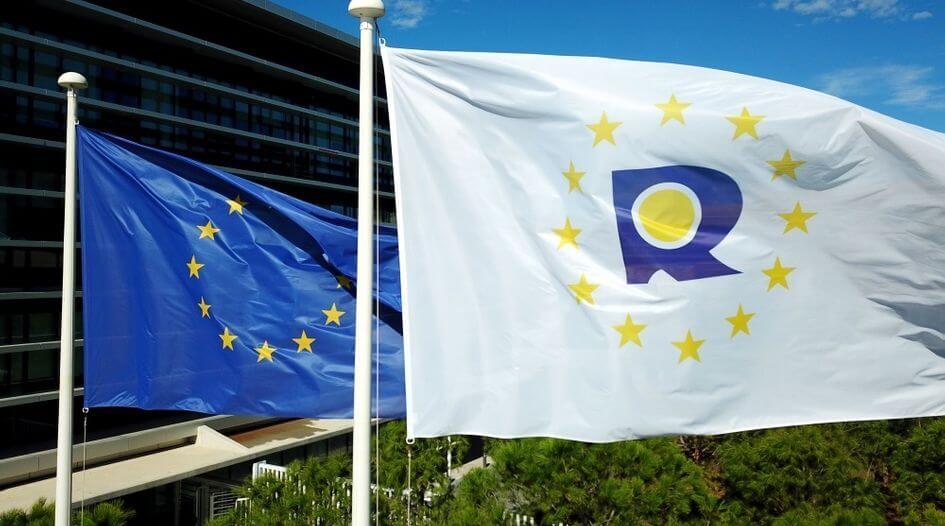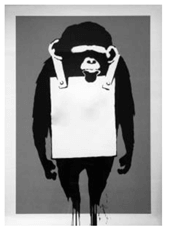
Major success for Banksy at the EUIPO Board of Appeal
- FCB sought to invalidate the ‘Laugh Now’ mark, held by PCO, alleging that the sign had been applied for in bad faith
- The Cancellation Division found that the sign had been filed with no genuine intention to use it as a trademark, and to circumvent copyright law
- The Board of Appeal annulled the Cancellation Division’s decision in its entirety
On 25 October 2022 the Fifth Board of Appeal of the EUIPO issued its decision in Pest Control Office Limited v Full Colour Black Limited (Case R 1246/2021-5). In a success for Banksy, the Board of Appeal annulled the Cancellation Division’s decision dated 18 May 2021 in its entirety and rejected the claim that the figurative mark known as “Laugh Now, But One Day We’ll Be In Charge” (the ‘Laugh Now’ mark) had been applied for in bad faith.
Background
The Laugh Now mark
As part of a long-running dispute between Full Colour Black (FCB) and Pest Control Office (PCO), the authenticating body for the artist known as Banksy (PCO will be referred to as ‘Banksy’ in the rest of this article), including numerous cancellation actions fi led by FCB against Banksy’s EUTM registrations, the latest development is a decision concerning an application by FCB to cancel the EUTM registration for the Laugh Now mark.

The contested sign is a figurative depiction of a chimpanzee with a blank sandwich board hanging around its neck, and the registration covers various merchandising goods and entertainment/education services. The mark, which was registered in 2019, is based on an artwork commissioned by a nightclub in Brighton, created by the artist Banksy back in 2002 and sold at Bonhams in 2008 (see here: Laugh Now, 2002).
FCB’s challenge to the Laugh Now mark
Laugh Now is one of several registrations held by Banksy to be challenged by FCB on the ground of bad faith. FCB maintains the view that Banksy has registered numerous trademarks in bad faith as a way of circumventing copyright law to protect the artist Banksy’s identity, and to use trademark protection to monopolise rights in his artworks, without any intention to use such works as trademarks.
The challenge relied upon the grounds of descriptiveness/lack of distinctiveness under Article 59(1)(a) of Regulation 2017/1001 (in conjunction with Article 7(1)(b) and (c)) and bad faith under Article 59(1)(b) of the regulation.
FCB submitted various arguments to support the ground of bad faith, including the contentions that Banksy:
- did nothing to stop third parties from using and commercialising his works;
- created the pop-up shop called Gross Domestic Product for the sole purpose of fulfilling trademark use requirements and publicly declared as such;
- encouraged the public to download and use his works; and
- had no legitimate intention to use the contested sign as a trademark, but only wanted to circumvent having to rely on copyright(and revealing his identity) to protect his work.
The Cancellation Division did not assess the grounds relied upon under Article 59(1)(a). As to the ground of bad faith, the Cancellation Division ultimately found that the Laugh Now mark had been applied for in bad faith by virtue of being fi led with no genuine intention to use it as a trademark, and to circumvent copyright law.
Decision
Banksy appealed the Cancellation Division’s decision to the Board of Appeal. The Board annulled the decision in full.
Distinctiveness/descriptiveness of the contested sign
Although this ground was not looked at by the Cancellation Division, the board considered that it should, and held that:
- the fact that the contested sign was an artwork was not an obstacle to the sign also being a trademark;
- the contested sign did not coincide with the appearance of a product or packaging in this case, and FCB did not show whatfeature or characteristic of the goods/services would be indicted by the contested sign;
- the depiction in the contested sign was “an unusual combination”, “quite striking” and would stick in the mind of consumers; and
- FCB did not present convincing arguments or any evidence to show that the contested sign was recognised or used in way which would mean that it lacked distinctive character or would be seen as descriptive of the relevant goods and services in question.
The board ultimately rejected the request for invalidity based on these grounds.
Bad faith
With regard to bad faith, the board held that:
- use of the mark permitted by Banksy was for non-commercial purposes, and whether or not he decided to enforce his rights against third parties misusing his works did not show a lack of intention to use the contested sign;
- whether or not Banksy filed trademarks in order to benefit from anonymity did not indicate a lack of intention to use the contested sign;
- Banksy’s views on copyright were irrelevant to a fi nding of bad faith in this case;
- the evidence submitted relating to the pop-up shop was not relevant to this case; and
- the arguments regarding Banksy trying to prohibit use of the artwork by third parties and circumventing copyright law and US trademark law did not constitute bad faith.
Overall, the board concluded that the arguments made by FCB, taken as a whole, did not demonstrate that a dishonest behaviour or intention existed when the application was fi led by PCO on behalf of Banksy.
Comment
A case such as this highlights the very fact-specific nature of bad-faith cases and the extent to which a cancellation applicant must go in order to prove its case. It also brings to the fore an interesting example of how copyright and trademark rights might coincide when it comes to protecting IP rights in artworks. It is not clear at this stage whether FCB will appeal, but it certainly is unlikely to be the last we hear about the wider dispute between these two parties.
This article first appeared in WTR Daily, part of World Trademark Review, in November 2022. For further information, please go to www.worldtrademarkreview.com.








